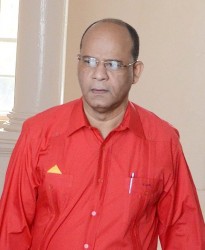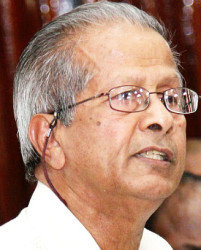As the PPP continued to take the government to task for the planned closure of the Wales sugar estate, General Secretary Clement Rohee yesterday dodged questions on the closures of the estates at Diamond and La Bonne Intention (LBI) while the party was in office.
Instead, Rohee told reporters that they ought to do their research on the issue and make public what they have found.
“I think the facts speak differently… but I am not going to help anyone do the research in respect to these two matters,” he told a press conference held at Freedom House yesterday.

He was specifically asked to identify the difference between the closure of the two estates under the PPP/C-led government and the planned closure of the Wales estate. In response, he questioned, in part, if the reporter who asked the question was raising the issue to get “some kind of juicy political story to write about.”
It was at this point that Rohee suggested that research be done before pronouncements are made. He noted that he hasn’t seen anything published in the newspapers in this regard.
Rohee denied that he was dodging the question and stressed that the two matters being raised occurred under different circumstances and moreover that “other solutions” were found in addressing the closure of the Diamond and LBI estates.
Asked for his own opinion on the difference between the two, he maintained that he wanted to first see publications of research with “authoritative quotations.”
When asked if he wasn’t going to answer the questions posed, Rohee insisted that he had.
Later, he opted not to answer a question on what efforts were made by the then PPP/C government to rehabilitate the Wales estate, given its run-down state.
He then went into the production figures for the estate for last year and questioned how a run-down estate could be grinding cane and producing sugar at such an “enormous capacity.”

Responding to claims from some quarters that the PPP is politicising the closure of the estate, Rohee said, “Anyone who knows the history of the PPP and the history of the Cheddi Jagan, founder of the PPP and others would recognise that the struggles of the PPP is linked to the struggle of the sugar workers and the sugar industry.”
Rohee also said after taking office in 1992, the PPP/C shelved the plans and efforts by the former PNC administration to privatise the industry.
“Just after eight months in government, the APNU+AFC is behaving as though it has the solution to all the economic, social and political problems in our country in general and the sugar industry in particular,” he, however, added.
Reading from a prepared statement, Rohee commended the aggrieved sugar workers for protesting even as he lamented that “the industry has been the zone of brutal and incalculable exploitation of workers.” (Last Thursday, sugar workers protested outside of the Public Buildings, where the National Assembly was meeting.)
“It is indeed sad, very sad, to see after years of sweat and toil in the cane fields, the insensitive treatment being meted out to the workers at Wales sugar estate,” he further said.
He noted that closure of the estate will have damaging social, psychological and economic impact on the people and their livelihoods in the community, while signalling that the PPP would continue to oppose it. “The party will not stand idly by and watch the melt down of the sugar and any other industry in Guyana where the livelihoods of workers and farmers will be adversely affected,” he warned.

Government, via a statement issued by the Agri-culture Ministry, announc-ed its intention last Monday to close the estate, in what was the first major decision it has taken on the beleaguered industry, which has seen slumping production over the last decade and huge debt.
It said the Wales estate is projected to operate at a loss of between $1.6 billion and $1.9 billion this year. As a result of the decision, it noted that there will be no further land preparation and planting. As the estate’s cultivation is reaped, the land would be retired and kept for diversification ventures, it added.
Government has said the Wales operation was not feasible and plans are in the pipeline to cushion the impact of its closure.
Dozens of tillage workers and planters will be directly affected by the closure as they will be out of work once the estate is officially closed.
Unions
The unions representing sugar workers, the Guyana Agricultural and General Workers’ Union (GAWU) and the National Associa-tion of Agricultural, Com-mercial and Industrial Employees (NAACIE), have criticised the decision and the manner in which it was announced.
Yesterday they called on the government to hold off on the decision until such time as a study into the social and economic impacts of the closure is conducted.
At a press conference held at NAACIE’s High Street, Kingston headquarters, the unions maintained that the estate should not be closed as they failed to see how this closure is in the interest of the people of Wales, the West Bank or Guyana.
Instead they urged government to “consider a workable plan geared to make the estate overcome its present difficulties.”
The unions have repeatedly lamented the government’s failure to consult with them on the decision to close the estate.
NAACIE President Kenneth Joseph said, “There should’ve been a discussion with the workers and the union but this did not happen. Instead there was a decision.” He referenced a meeting held between GuySuco and the union on January 20, at which he claimed the representatives of the sugar company were unable to answer the union’s concerns or clearly share plans for the workers and the estate properties.
The unions, he said, “were informed that the plan was to absorb the workers at Uitvlugt Estate, others to be made redundant and some others given jobs in a business venture.”
He claimed that efforts to seek more information about the business venture proved futile and this exercise left them with the view that “the hazy ideas were not thought out and in all likelihood could not be realized. Every question asked we heard: they are to get back to us. There was no evidence that anyone of them knew what they were there for.”
However, when pressed by reporters neither Joseph, nor GAWU Chair Komal Chand could clearly articulate what contributions they would’ve made or will make to a consultation.
“We want a study which concludes you have done a consultation. We are saying engage us, we have ideas, we have suggestions. Let us go through this exercise and we might very well come up with a solution,” Chand said.
This call comes even as Guysuco is considering beginning a non-sugar venture at that West Bank Demerara location from October this year.
Chand said he wanted the study to focus on whether the workers should plant fruits and vegetables, and whether the factory workers would require training.
“First we would like to hear from them rather than say what we would like. We want to see that this whole process is halted so we could have discussions and consultations. …We wouldn’t want to advise what should be the venture. A study ought to be done to ensure that the people are gainfully occupied and they would be able to earn as much as they are earning now,” Chand said.
Wales currently has 1,700 active field and factory workers and 775 private cane farmers.







